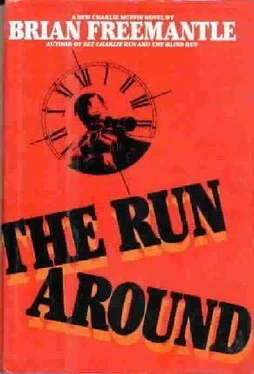Brian Freemantle - The Run Around
Здесь есть возможность читать онлайн «Brian Freemantle - The Run Around» весь текст электронной книги совершенно бесплатно (целиком полную версию без сокращений). В некоторых случаях можно слушать аудио, скачать через торрент в формате fb2 и присутствует краткое содержание. Жанр: Шпионский детектив, на английском языке. Описание произведения, (предисловие) а так же отзывы посетителей доступны на портале библиотеки ЛибКат.
- Название:The Run Around
- Автор:
- Жанр:
- Год:неизвестен
- ISBN:нет данных
- Рейтинг книги:3 / 5. Голосов: 1
-
Избранное:Добавить в избранное
- Отзывы:
-
Ваша оценка:
- 60
- 1
- 2
- 3
- 4
- 5
The Run Around: краткое содержание, описание и аннотация
Предлагаем к чтению аннотацию, описание, краткое содержание или предисловие (зависит от того, что написал сам автор книги «The Run Around»). Если вы не нашли необходимую информацию о книге — напишите в комментариях, мы постараемся отыскать её.
The Run Around — читать онлайн бесплатно полную книгу (весь текст) целиком
Ниже представлен текст книги, разбитый по страницам. Система сохранения места последней прочитанной страницы, позволяет с удобством читать онлайн бесплатно книгу «The Run Around», без необходимости каждый раз заново искать на чём Вы остановились. Поставьте закладку, и сможете в любой момент перейти на страницу, на которой закончили чтение.
Интервал:
Закладка:
‘What else?’ said Ball, almost wearily.
‘It’s a funny thing,’ said Donnelly. ‘But when a person enters a room to find a discarded glass — particularly a glass like that, with just a little drop in the bottom — the instinctive reaction is to pick it up and smell it.’ From his inside pocket Donnelly took an expanding device, like a pair of scissors without any cutting edge, and put the jaws inside the glass, expanding them so he could lift it. ‘He’ll check, for fingerprints when he gets back,’ said Donnelly. ‘And see that?’ He pointed to a ring beneath. ‘It looks as if the glass made it but it’s another marker, to ensure it remains in the same position.’ He replaced the glass and extracted his lifting tool, offering it to the other man. ‘Try the whisky bottle and the cap,’ he suggested. ‘There’ll be rings beneath each.’
Ball did and there were.
‘Now the plate,’ ordered Donnelly. ‘Use the tool like pliers: it works. Be careful not to disturb the knife and fork, though.’
There was a ring beneath the plate and Ball said: ‘I suppose the knife and fork were particularly placed?’
‘Of course,’ said Donnelly. ‘The bed will be unmade, when we get to the bedroom. It’s much more difficult to search an unmade bed and leave it exactly as it was than it is to turn over one that’s neat and tidy. Watch the pillow indentations, too. And any discarded clothes: there’re sure to be some. Don’t think the pile of washing up in the kitchen sink is slovenliness, either. Or that what’s thrown in any of the bins or wastepaper baskets has actually been thrown. Be careful of any disarranged curtain or covering. Re-position any books precisely as you find them. Newspapers and magazines, too. And be careful about screws.’
‘Screws?’
‘We’ll need to look in the back of the television set and the radio: behind some cabinets and closets, probably,’ reminded the older man. ‘Don’t dare let the screwdriver slip, to score the screw head. And make sure when you re-fasten that the cross-mark on the screw head is left in the same position as it was when you undid it.’
‘Nobody’s that careful!’ protested Ball.
‘Just do as I say,’ ordered Donnelly.
The bed was unmade and there were clothes scattered on the floor, the sink was stacked with dirt-rimmed cups and glasses and plates and the dustbins and waste baskets were full. It took nine hours of uninterrupted searching and they were exhausted when they finished, despite which Donnelly insisted on a check of everything that had been disturbed, to ensure it had been undetectably replaced.
‘I can’t get over the books on the shelves!’ said Ball, as they drove away. ‘Goethe and Pushkin were in the original. And the Robert Frost were first editions! All that and then at least a year’s supply of Playboy !’
‘He’s a surprise a minute,’ agreed Donnelly.
‘You really think he’ll spot the entry scratch?’
‘Maybe.’
‘What about the rest of the search?’
‘There’s no way we’ll ever know, is there?’
‘I guess I owe you an apology.’
‘Forget it,’ dismissed Donnelly.
‘Where the hell did you learn so much!’ demanded the younger man, admiringly.
‘Charlie Muffin taught me,’ said Donnelly.
It was a full meeting of the committee, with Mikhail Lvov there as well as Berenkov and the KGB chairman.
‘A copy-book collection?’ demanded Lvov. The confident head of the assassination division regarded Zenin’s uninterrupted visit to the Bern embassy as a complete vindication of his insistence that the Run Around operation should be continued and was making absolutely sure that others more important in the Kremlin came to the same conclusion.
‘There was never any doubt about Zenin’s professionalism,’ said Berenkov. ‘The man is brilliant.’
‘Sufficiently brilliant to defeat two of the special groups of Watchers whom you sent to guard the embassy!’ said Lvov.
Kalenin and Berenkov viewed differently the open challenge. Berenkov hadn’t until that moment imagined the other man to be the clearly emerging internal threat that he was. Kalenin decided to sit back and let the dispute take its course: he was quite sure about his own ability to survive. He hoped Berenkov was up to it.
‘Brilliant,’ conceded Berenkov, cautiously. The better fighter was always careful at the beginning of a contest to study the footwork of his opponent.
‘On one side if not the other,’ said Lvov. ‘Little point, really, in bothering to send them at all. Certainly no purpose whatsoever in retaining them there, now that Zenin has made the pick-up.’
‘What are your views upon bringing them back, Comrade Berenkov?’ asked the KGB chairman, formally.
‘I think they should be kept there for a while longer,’ said Berenkov. He was curious at Lvov’s response.
‘But for what purpose!’ demanded the assassination chief. ‘They can take no active or useful part, any more. Not that they took an active or useful part before.’
A tendency for over-confidence, gauged Berenkov. He said: ‘Let’s just consider it insurance.’
‘Against what!’ demanded Lvov.
‘What one always insures against,’ replied Berenkov, ‘the unexpected disaster.’
‘There is going to be no unexpected disaster,’ said Lvov.
‘I hope not,’ said Kalenin.
‘Not in Switzerland at least,’ said Lvov, exceeding himself.
Neither Kalenin nor Berenkov responded, each busy with their own thoughts.
Chapter Twenty-one
With his habitual and trained caution, Vasili Zenin arrived in Geneva early and by train, as the first rehearsal for what would be necessary later. During its final approaches to Geneva, through the outskirts of the city, the Russian gazed from the carriage windows to the streets outside and occasionally below, watching the rush hour traffic and confirming his earlier impression of the uselessness of a car for his escape. The dossier of complaint against the Soviet embassy in general and Yuri Ivanovich Lyudin in particular was going to be very extensive.
From the Cornavin terminal, Zenin walked in the direction against the clogged traffic along the one-way Rue des Terreaux du Temple and on the side furthest from the cafe he had specified in the unsigned note to Sulafeh Nabulsi. It was just opening, black-aproned waiters re-arranging stacked chairs around freshly washed pavement tables: three were pulling from its sprung housing the striped canvas canopy to form a protective roof over the outside area. It had started a bright day, despite being autumn, and Zenin hoped the weather would hold so they could later sit at a kerbside table: it would be easier to run, if he had to run, from somewhere already out in the open rather than from inside the more easily sealed cafe interior.
In the Rue Bautte there was a much smaller place, more a bar and tabac than a cafe, already open for early morning workers. On the pavement there were three minute tables, each bordered by plastic-ribbed chairs, but Zenin went inside, wanting concealment now. He ordered coffee and from a bench directly against the fronting window looked across at the designated meeting place, studying everything with proper professional alertness. If the note to the woman had been intercepted or found — or if she were not the committed zealot she was supposed to be but some sort of bait — then that afternoon he would be walking into a trap, a trap at this moment being primed and set.
He watched the waiters individually, intent upon establishing that each moved about the cafe and the tables with accustomed familiarity, with none showing an awkwardness to hint at hurriedly drafted-in counterintelligence officers. Satisfied all the waiters were genuine, Zenin extended the examination, looking for any buildup of loitering groups of Watchers. Or maintenance tents or vans in which they might have been hidden. When he failed to locate any he sought out parked but enclosed vehicles which could have disguised mobile communication centres from which his encirclement could have been co-ordinated once he got to the cafe. Again there was nothing.
Читать дальшеИнтервал:
Закладка:
Похожие книги на «The Run Around»
Представляем Вашему вниманию похожие книги на «The Run Around» списком для выбора. Мы отобрали схожую по названию и смыслу литературу в надежде предоставить читателям больше вариантов отыскать новые, интересные, ещё непрочитанные произведения.
Обсуждение, отзывы о книге «The Run Around» и просто собственные мнения читателей. Оставьте ваши комментарии, напишите, что Вы думаете о произведении, его смысле или главных героях. Укажите что конкретно понравилось, а что нет, и почему Вы так считаете.












